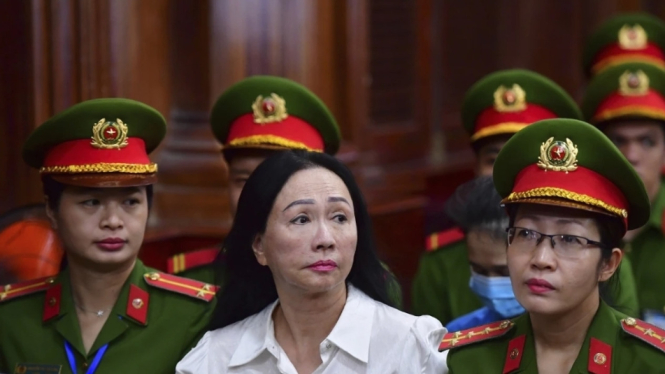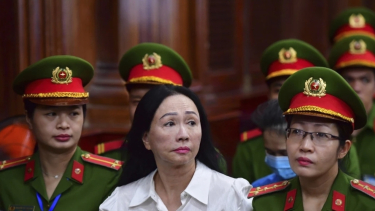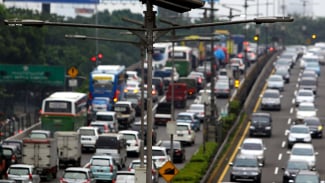Vietnamese Sentenced to Death for $27 Billion Fraud Case
- VIVA.co.id/Natania Longdong
Vietnam – Behind the stately yellow portico of the colonial-era courthouse in Ho Chi Minh City, a 67-year-old Vietnamese property developer was sentenced to death on Thursday (Apr 11) for looting one of the country's largest banks over a period of 11 years.
It's a rare verdict - she is one of very few women in Vietnam to be sentenced to death for a white collar crime.
The decision is a reflection of the dizzying scale of the fraud. Truong My Lan was convicted of taking out $44bn or equivalent to IDR 697 trillion in loans from the Saigon Commercial Bank.
The verdict requires her to return US$27 billion or IDR 427 trillion, a sum prosecutors said may never be recovered. Some believe the death penalty is the court's way of trying to encourage her to return some of the missing billions.
Pengusaha properti Truong My Lan ditangkap korupsi Rp 191 triliun
- Vietnamnet
The habitually secretive communist authorities were uncharacteristically forthright about this case, going into minute detail for the media.
They said 2,700 people were summoned to testify, while 10 state prosecutors and around 200 lawyers were involved, as quoted from BBC site.
The evidence was in 104 boxes weighing a total of six tonnes. Eighty-five others were tried with Truong My Lan, who denied the charges and can appeal.
All of the defendants were found guilty. Four received life in jail. The rest were given prison terms ranging from 20 years to three years suspended. Truong My Lan's husband and niece received jail terms of nine and 17 years respectively.
"There has never been a show trial like this, I think, in the communist era," said David Brown, a retired US state department official with long experience in Vietnam.
"There has certainly been nothing on this scale,"
The trial was the most dramatic chapter so far in the "Blazing Furnaces" anti-corruption campaign led by the Communist Party Secretary-General, Nguyen Phu Trong.
A conservative ideologue steeped in Marxist theory, Nguyen Phu Trong believes that popular anger over untamed corruption poses an existential threat to the Communist Party's monopoly on power.
He began the campaign in earnest in 2016 after out-manoeuvring the then pro-business prime minister to retain the top job in the party.
The campaign has seen two presidents and two deputy prime ministers forced to resign, and hundreds of officials disciplined or jailed. Now one of the country's richest women has joined their ranks.
Truong My Lan comes from a Sino-Vietnamese family in Ho Chi Minh City, formerly Saigon. It has long been the commercial engine of the Vietnamese economy, dating well back to its days as the anti-communist capital of South Vietnam, with a large, ethnic Chinese community.
She started as a market stall vendor, selling cosmetics with her mother, but began buying land and property after the Communist Party ushered in a period of economic reform, known as Doi Moi, in 1986. By the 1990s, she owned a large portfolio of hotels and restaurants.
Although Vietnam is best known outside the country for its fast-growing manufacturing sector, as an alternative supply chain to China, most wealthy Vietnamese made their money developing and speculating in property.
All land is officially state-owned. Getting access to it often relies on personal relationships with state officials. Corruption escalated as the economy grew, and became endemic.
By 2011, Truong My Lan was a well-known business figure in Ho Chi Minh City, and she was allowed to arrange the merger of three smaller, cash-strapped banks into a larger entity: Saigon Commercial Bank.
Vietnamese law prohibits any individual from holding more than 5 percent of the shares in any bank.
But prosecutors say that through hundreds of shell companies and people acting as her proxies, Truong My Lan actually owned more than 90 percent of Saigon Commercial.
They accused her of using that power to appoint her own people as managers, and then ordering them to approve hundreds of loans to the network of shell companies she controlled.
The amounts taken out are staggering. Her loans made up 93 percent of all the bank's lending.
According to prosecutors, over a period of three years from February 2019, she ordered her driver to withdraw 108 trillion Vietnamese dong, more than $4 billion in cash from the bank, and store it in her basement.
That much cash, even if all of it was in Vietnam's largest denomination banknotes, would weigh two tonnes.
She was also accused of bribing generously to ensure her loans were never scrutinised. A former chief inspector at the central bank was given a life sentence for accepting a $5m bribe.


































